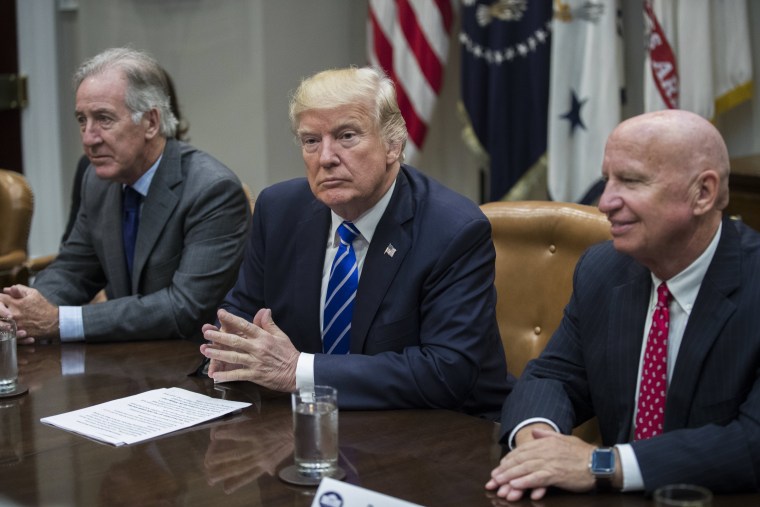A couple of weeks ago, Donald Trump announced the cancellation of scheduled pay raises for roughly 1.8 million federal employees. The president justified the move by arguing, "We must maintain efforts to put our nation on a fiscally sustainable course."
The move would hurt those workers, obviously, but it would save the federal government $25 billion -- all in the name of fiscal sustainability.
It's against this backdrop that House Ways and Means Committee Chairman Kevin Brady (R-Tex.) and his Republican brethren have unveiled a new package of tax breaks -- they're calling it "tax reform 2.0," which is silly given that neither this nor the previous tax plan constituted meaningful "reform" -- which now has a price tag. The Washington Post reported:
Brady's plan would add about $630 billion to the federal deficit by 2029, on top of the $1.9 trillion the law is already expected to cost when factoring for higher interest payments, Congress' Joint Committee on Taxation said on Tuesday.Beyond those three years, the costs would continue to pile up. Starting in 2026, the cuts could cost the federal government about $165 billion annually in today's dollars, according to projections by the Tax Foundation, a conservative-leaning think tank. That annual cut would add up to a roughly $2.4 trillion additional to the federal deficit over a 10-year period, the Tax Foundation found.
So let me get this straight. Two weeks ago, the nation couldn't afford $25 billion in pay raises for federal workers, but we now afford $630 billion in new tax breaks for the wealthy?
The timing of the new Republican tax plan could be better. After all, the Congressional Budget Office said this week the federal budget deficit is quickly approaching $900 billion, and the party of "fiscal sustainability" is apparently eager to make it vastly larger with more tax breaks.
But that's not the only relevant angle here.
If a progressive lawmaker were to propose a series of proposals totaling $630 billion over the next decade -- a federal universal pre-K program, student-loan forgiveness, expanded health care benefits, etc. -- it's a safe bet that congressional Republicans would insist that the United States simply can't afford such investments. To even consider programs like these would be a reckless and fiscally irresponsible course.
But the fact that we can all hear that conversation playing out in our minds is emblematic of the problem: Republican policymakers believe public investments are unaffordable, while simultaneously believing that no price is too high for tax breaks for the wealthy. The familiarity of the GOP's case doesn't mean we should take it seriously.
